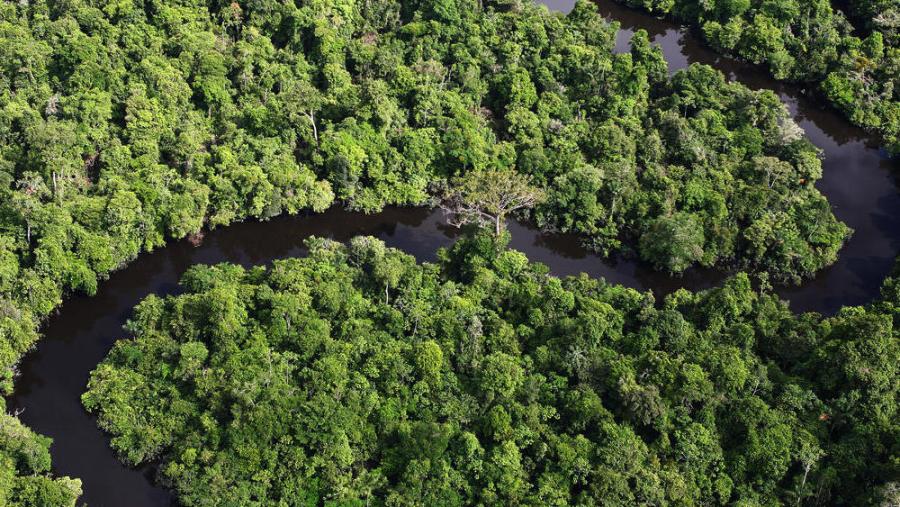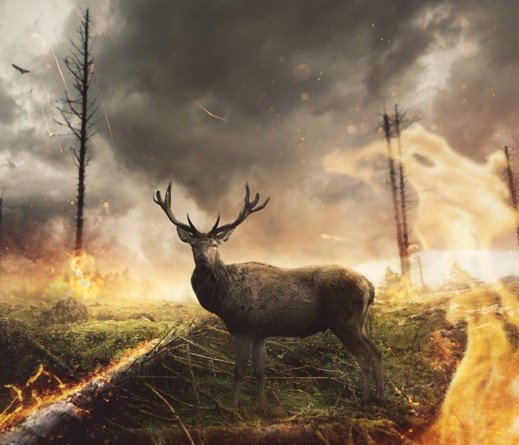
Think about the following questions.
1. Do you know where your food comes from and how it is produced?
2. What kinds of plants and animals do you see where you live?
3. Can you think of anything you do that might have an impact on nature?
VOCABULARY PREVIEW
Match each New Academic Word List(NAWL) word with the correct definition.
- cattle
- artificial _____
- biodiversity _____
- herbicide _____
- epidemiology _____
- unify _____
- a. not natural; made by people
- b. male and female cows kept on a farm for milk and meat
- c. to cause people or things to be joined or brought together
- d. the number of different plants and animals that exist in a particular area
- e. the study of diseases and how they are spread
- f. a chemical that is used to destroy unwanted plants
HUMANS AND THE NATURAL WORLD

Humans encroach1 further on nature with every passing year. Between 1996 and 2016, the Earth lost an area of forest larger than South Africa. Over the past five hundred years, almost nine hundred species have become extinct. Even now, twenty-five percent of mammals2 and 12.5 percent of birds are at high risk of extinction. This does not just have a negative impact on flora and fauna3 - it affects humans too.
Agriculture can have a particularly negative effect on the natural world because modern intensive farming creates unhealthy monocultures. These are large areas of land which are used to grow just one crop, and as such, they lack biodiversity. Often, these areas are also treated with pesticides and herbicides. These chemicals kill off any remaining species which might have survived in these artificial landscapes. A lack of biodiversity can have consequences4 for humans. For example, the world's bumblebee population has shrunk by as much as ninety-three percent in the last twenty years. Humans rely on bumblebees to spread pollen and produce fruit and vegetables.
Meat farming also has a huge impact on landscapes. Since 1950, the Amazonian rainforest alone has been reduced in size by seventeen percent; we call this deforestation. Much of it has been to create grazing land for cattle. Forested areas help to absorb carbon5, and we are losing them just as our cars, airplanes, factories, and power stations produce more carbon than ever before. This results in global warming, which threatens wildlife in untouched6 environments such as Antarctica. At the same time, it puts many towns and cities at risk of flooding as sea levels rise.
Humans also encroach on nature through direct physical contact with animals. Factory farming forces animals like cows, pigs, and chickens to live tightly packed together. This is not only deeply unpleasant for the animals, but it also carries a risk for humans. Epidemiology suggests that in these conditions, new viruses are highly likely to develop. Close human contact with these animals can then lead to the transmission of diseases such as bird flu, which is easily passed from farmed chickens to humans.
But the greatest risks come from increased contact with wild animals, which often occurs as cities expand and wild habitats are absorbed. Rats, monkeys, and bats live among humans and are responsible for hosting as many as seventy-five percent of all viruses. Rats carry hantavirus, leptospirosis, and many other diseases; monkeys carry B virus, yellow fever, and rabies. Bats, meanwhile, have been linked7 to the SARS and Ebola viruses, among others.
In many developing countries, rather than trying to avoid contact with wild animals, people actively hunt for them. Traders at wildlife markets sell wild animals, or bushmeat, for food. Often, these markets are viewed as traditional, and bushmeat is believed to have positive effects on human health. In many cases, the animals sold at wildlife markets are endangered species; in fact, their rarity8 is often why they are valuable and in demand.
There are now several campaigns to end the selling of bushmeat at wildlife markets. However, these may cause cultural tensions between developed and developing nations. Other differences could also arise9 over how to battle encroachment. Developed countries are financially10 able to protect animals; they can set aside land as wildlife reserves because their populations are growing less quickly, or even decreasing. In reality, though, they now rely on developing countries for farming and manufacturing11, leading to more encroachment in these nations. Clearly, it's time for all nations to unify in their efforts to address the human impact on nature.
New Academic Word List
- encroach 1 : v. to gradually move or go into an area that is beyond the usual or desired limits
- mammal 2 : n. any animal which feeds milk from its body to its young; humans, dogs, cows, and monkeys are examples of mammals
- flora and fauna 3 : n. plants and animals
- consequence 4 : n. the result of an action or situation, especially a bad result
- carbon 5 : n. short form of carbon dioxide, a gas usually produced by burning coal or oil
- untouched6 : adj. not changed; still in the original state or condition
- link 7 : v. to show or prove that a person or thing is related to or involved with something
- rarity 8 : n. something rare; unusual, or limited in number
- arise 9 : v. to happen or occur
- financially 10 : adv. in a way that relates to money or money management
- manufacturing 11 : n. the business of producing goods in large quantities
READING COMPREHENSION
A ‣ Mark each statement as true (T) or false (F) according to the reading.
- Nine hundred species have become endangered over the last five hundred years.
- True
- False
- Growing just one crop on a large area of land is bad for the environment.
- True
- False
- Most diseases spread from animals to humans are due to factory farming.
- True
- False
- Pressure to close bushmeat markets may cause problems between countries.
- True
- False
- Developing countries are able to provide more space for wild animal habitats.
- True
- False
B ‣ Choose the best answer according to the reading.
- What is the main topic of the reading?
- a. The effect the natural world is having on agriculture
- b. The differences between animal and human behavior
- c. The consequences of the human impact on nature
- d. The ways humans can protect the Earth's climate
- Which of these is NOT a reason why people buy bushmeat?
- a. It is thought to be healthy.
- b. It is thought to be traditional.
- c. It is thought to be delicious.
- d. It is thought to be rare.
- In paragraph 7, the word they refers to _____.
- a. populations
- b. animals
- c. wildlife reserves
- d. developed countries
- Which statement would the writer most likely agree with?
- a. Developed countries should support developing countries in trying to protect nature.
- b. Bushmeat markets should be protected because they are important in many cultures.
- c. Deforestation is problematic but necessary so that humans can make enough food.
- d. Humans should have more contact with wild animals to stay in touch with nature.
C ‣ Fill in the blanks with information from the reading.
- monoculture:
_____ - deforestation
_____ - bushmeat:
_____
SUMMARY
An introductory sentence for a brief summary of the passage is given below. Choose three more sentences to complete the summary.
First Sentence: There are several ways in which humans are encroaching on the natural world.
-
- 1 Farmers use intensive farming methods which destroy biodiversity and reduce populations of important species.
- 2 It remains to be seen how global warming will affect sea temperatures, although they look very likely to rise.
- 3 Humans are cutting down trees in order to make space for cattle farming, which leads to a decrease in the Earth's ability to absorb carbon.
- 4 Forest fires are leading to an increase in the carbon levels in the Earth's atmosphere.
- 5 In developing countries, many people hunt for wild animals such as bats to sell at bushmeat markets.
VOCABULARY PRACTICE
Fill in the blanks with the words in the box. Change the form if necessary.
- unify
- cattle
- biodiversity
- epidemiology
- herbicide
- artificial
- In order to increase _____, areas of land should be left to grow naturally.
- Milk, cheese, and beef are produced by _____ farmers, who require large, open areas of land.
- To study diseases and reduce their spread, governments need to invest in _____.
- Crops are sprayed with _____ to stop unwanted plants from growing among them.
- Citizens who disagree politically often _____ when their country experiences an emergency.
- Some sodas use _____ sweeteners instead of sugar.
SUPPLEMENTAL READING
Peter Singer and Animal Liberation

In 1975, the Australian philosopher Peter Singer wrote a revolutionary book, Animal Liberation. When the book first appeared, Singer's ideas were seen as strange, fringe beliefs. Today, however, many of Singer's ideas have been accepted by individuals and even governments.
Singer was initially influenced by philosopher Jeremy Bentham, who was born in England in 1748. Bentham was one of the first to write about the rights of animals. The question, Bentham argued, was not if animals could think or if they could talk, but rather if they could suffer.
This argument convinced Singer that humans needed to change the way they treated animals through deforestation, factory farming, animal testing, zoos, and even the way we buy and sell them as pets. In his book, Singer accepted that animal rights and human rights were different. He admitted that if some scientific testing on an animal like a mouse could save millions of lives, then it might be worth it.
However, many of the ways we use animals, Singer argued, were not actually helpful to humans at all. In fact, Singer predicted that the number and variety of diseases would grow as human contact with animals increased. He also suggested that deforestation for cattle farming would have a negative impact on the entire planet. Singer's book argued that what is good for animals is usually good for humans, too. Humans should not think of "the natural world," Singer suggested, as separate from themselves.
Fill in the blanks with information from the reading.
- According to Jeremy Bentham, the question was whether animals could _____.
- Singer accepted that it might sometimes be necessary to do scientific _____ on animals.
- Singer predicted that the number and variety of _____ would increase as we spent more time around animals.

Leave a comment
Load more